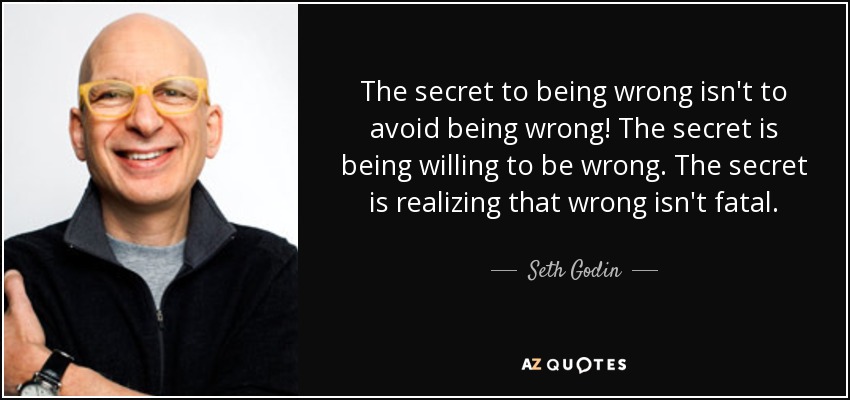There’s a major problem in our society today. Not enough people are wrong – or at least, not enough of them are willing to admit they are. Being wrong never used to be such a stressful event, but it seems that admissions of wrongness are a rare occurrence in our society. And it’s hurting us.
 Part of the reason being wrong is viewed with such dismay is because we conflate being wrong with being stupid. Intelligence is highly prized in our society, but being intelligent is not measured by being right all the time. In fact, if you look at the traits that are common in intelligent people, one of them is openness to new ideas and evidence. They’re ok with being corrected. This is also one of the fundamental principles of the scientific method. Intelligent people are ok with being wrong because it demonstrates a desire to learn.
Part of the reason being wrong is viewed with such dismay is because we conflate being wrong with being stupid. Intelligence is highly prized in our society, but being intelligent is not measured by being right all the time. In fact, if you look at the traits that are common in intelligent people, one of them is openness to new ideas and evidence. They’re ok with being corrected. This is also one of the fundamental principles of the scientific method. Intelligent people are ok with being wrong because it demonstrates a desire to learn.
Wrongness is also feared because of how public many of our discussions are. With many discussions occurring online instead of in-person, there is now a physical record of our interactions. If we’re right, we are viewed as intelligent and received in a positive manner. Our rightness is shared, retweeted, and quoted as a trophy for all to see. If we’re wrong, we are ridiculed for being stupid. The evidence of our wrongness goes through the same pattern as someone who is right; only this time we are the subject of ridicule and belittlement.

Finally, we avoid being wrong because we’ve been sheltered from harm (or at least, what people perceive to be harm) our entire lives. Children born since the 1980s have been exposed to ever-increasing levels of protection – both from their parents and society – from a variety of threats. As Jonathan Haidt describes:
“…children largely lost the experience of having large swaths of unsupervised time to play, explore, and resolve conflicts on their own.”
Parents and society sheltered children from harm, and the Internet gave everyone an outlet to seek refuge from it. For the first time ever, physical proximity was no longer a factor in accessing communities of individuals who shared your views and interests. On the surface, this is a good thing. Individuals still move to certain cities to be around like-minded individuals, but nowhere is our tribalism more intense than online. Instead of being sheltered from physical and possibly emotional threats, we can now be safe from ideological threats.
Ironically, our efforts to stamp out wrongness in our lives is actually the wrong thing to do. Our obsession with safety and certainty has hindered our potential for growth, both as individuals and as groups. The concept of a comfort zone was first introduced to me during high school outdoor education classes. Everyone has a set of activities and ideas with which they are comfortable, and their propensity to try new things is also highly variable. There was no correct amount of comfort or desire to try new things, only that the desire was present and supported.

Unfortunately, we have moved in the other direction. We now equate certain forms of speech with violence. Concepts like safe spaces and trigger warnings have permeated our culture, despite consensus in the psychological literature cautioning against the efficacy or benefit of these strategies. In fact, techniques in cognitive behavioural therapy designed to help patients overcome trauma closely mimic the comfort zone approach. Gradual, supportive exposure to trauma triggers actually helps people overcome their fears.
Being right is orderly and comfortable. Being wrong is chaotic and uncomfortable. As the old adage goes: if you’re the smartest person in the room, you need to move to a different room. This is easier said than done. Exposing yourself to new people and ideas is a terrifying concept for some, if not most of us.
Over a thousand years before Descartes awakened us with: “I think therefore I am”, St. Augustine mused on humanity’s relation to God: “I err therefore I am”. Being wrong is normal; it demonstrates vulnerability and humility, two virtues that our society is deficient in. However, by refusing to be wrong, we choose to remain complacent with our comfortable state of rightness. There is a great risk to this lifestyle. We may become so enamoured with what we think is right, that eventually, most of what we know may be wrong.
